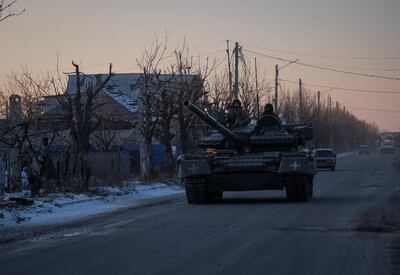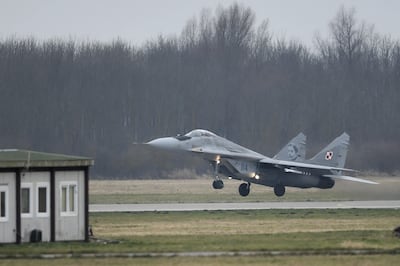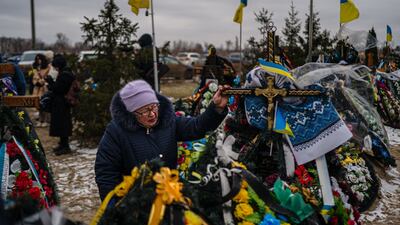Western powers widened their sanctions on Russia on Friday, aiming to increase pressure on the Kremlin a year since it invaded Ukraine.
China, meanwhile, weighed in with a 12-point peace plan that won a guarded welcome from Ukraine's President Volodymyr Zelenskyy.
Germany said any peace talks would come once Russian President Vladimir Putin saw his invasion as doomed to fail.
Leaders of the G7 countries — Britain, France, Germany, Italy, the US, Canada and Japan — agreed to chase down sanctions loopholes in talks on Friday.
They announced a goal to curb Russia's diamond exports and warned of “severe costs” for third countries aiding Russia.
Britain said it was banning the export of “every item Russia is using on the battlefield”, including aircraft parts and electric components.
The US took aim at Russia's mining and metals sector, with sanctions on four companies meant to stem a Kremlin revenue source.
But EU diplomats had yet to reach a deal on a tenth package of sanctions, with Poland complaining the proposed curbs did not go far enough.
“We must sustain the pressure so that Russia returns to the domain of international law and finally sits down at the negotiating table,” said German Chancellor Olaf Scholz.
Although the sanctions have not so far dissuaded the Kremlin from waging war, the US and Britain said the curbs were hampering the Russian war effort.
“Our sanctions have had both short-term and long-term impact, seen acutely in Russia’s struggle to replenish its weapons and in its isolated economy,” US Treasury Secretary Janet Yellen said.
“Our actions today with our G7 partners show that we will stand with Ukraine for as long as it takes.”
The G7 leaders were joined by video link by Mr Zelenskyy, who urged countries beyond the West to back a Ukrainian peace formula.
As western leaders expressed solidarity with Ukraine, UN Secretary General Antonio Guterres said life was “a living hell” for the country's people.
Support for Ukraine on anniversary of Russian invasion — in pictures
Sweden said it would send 10 Leopard tanks to Ukraine, while Germany raised its offer from 14 to 18.
With three coming from Portugal, it means those three nations can provide a complete 31-strong battalion, Germany said.
Poland said four of its Leopards had already arrived.
China, meanwhile, called for an end to western sanctions as part of its own 12-point peace proposal, which urged Russia and Ukraine to enact a ceasefire.
Mr Zelenskyy said he agreed with some parts but not others and said it was no bad thing that China was taking an interest.
Russia said it was open to talks but said any peace deal would have to recognise “new territorial realities” in Ukraine after it occupied parts of the country.
Western allies responded sceptically to the Chinese plan, with European Commission President Ursula von der Leyen saying China had already sided with Russia.
Ms von der Leyen is seeking a new batch of EU sanctions covering spare parts for Russian machines and jet engines, but the bloc's 27 members had yet to reach a consensus on Friday.
“We are not happy with it because it is too soft, too weak,” Poland's Prime Minister Mateusz Morawiecki said.
The G7 countries said they were "committed to preventing Russia from finding new ways to acquire advanced materials, technology, and military and industrial equipment".
They said they would work on new measures to reduce Russia's "significant revenues" from diamond exports.
The new package of British sanctions is based on intelligence suggesting Russia is struggling to produce equipment and having to scrounge for parts, the government said.
The hundreds of listed goods include radio equipment and components of military drones, while dozens more people linked to Russia's defence industry were hit with sanctions.
They include senior figures at Russian state-owned nuclear power company Rosatom alleged to have “deep connections” to the Russian military-industrial complex.
“Ukrainians are turning the tide on Russia but they cannot do it alone. That is why we must do more to help Ukraine win,” said Britain's Foreign Secretary James Cleverly.
“Today we are sanctioning the elites who run Putin’s key industries and committing to prohibit the export to Russia of every item Russia has been found using on the battlefield.”

UK Defence Secretary Ben Wallace told BBC radio the sanctions were designed to prevent Mr Putin from refurbishing an army that “has been incredibly damaged by this illegal invasion of his”.
“And I also think it is important to send a strong message that the international community, through sanctions, is not going away any time soon, which is another calculation that Putin was hoping for,” he said.
“Some of those individual sanctions are banning individuals but some of them are starting to recognise that there are countries, there are companies that are active in Russia and we don’t want them to be active in Russia, because Russia is taking their capabilities and using them, or using them into their military or to help the fight.”
Speaking to Times Radio, he said Britain was prepared to supply fighter jets to Eastern European allies to enable them to release their Soviet fighters to Ukraine.
Nato allies have been reluctant to release modern western aircraft to Kyiv, arguing that it would take too long to train aircrew.
“Those countries in Europe that have Russian Soviet fighter jets — MiG 29s or Su-24s — if they wish to donate, we can use our fighter jets to backfill and provide security for them as a result,” Mr Wallace said.
“They are already configured to fight in a Nato way, where, of course, Ukraine isn't.”







































